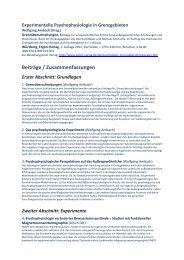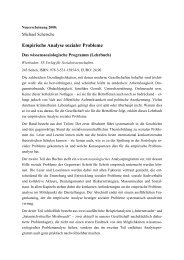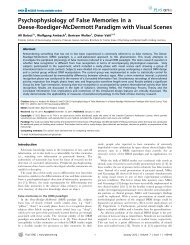Tätigkeitsbericht 2002/2003 - IGPP
Tätigkeitsbericht 2002/2003 - IGPP
Tätigkeitsbericht 2002/2003 - IGPP
Sie wollen auch ein ePaper? Erhöhen Sie die Reichweite Ihrer Titel.
YUMPU macht aus Druck-PDFs automatisch weboptimierte ePaper, die Google liebt.
Historical Studies, Archives and Library 49<br />
Tanagras trainierte mit Hilfe der Selbsthypnose eine<br />
Gruppe von “Sensitiven”, zumeist Frauen, mit denen<br />
er erfolgreiche Experimente zur Ferntelepathie<br />
mit Gruppen in anderen europäischen Ländern (z. B.<br />
mit Oesterreich in Tübingen) und Psychometrieversuche<br />
durchführte. 1930 organisierte er in Athen die<br />
4. Internationale Konferenz für Psychical Research, an<br />
der viele renommierte parapsychologische Forscher aus<br />
ganz Europa teilnahmen, u. a. Sir Oliver Lodge. Die<br />
Konferenzteilnehmer konnten sich der traditionellen<br />
griechischen Gastfreundschaft erfreuen, die Vorträge,<br />
Besichtigungen von Sehenswürdigkeiten und üppige<br />
Banketts umfasste. Nach Kriegsende war Tanagras<br />
aufgrund seines fortgeschrittenen Alters nicht mehr<br />
in der Lage, die Hellenic Society fortzuführen; viele<br />
seiner Mitarbeiter mussten sich um ihren Lebensunterhalt<br />
kümmern oder waren verstorben. Das Projekt<br />
skizziert Leben und Werk von Angelos Tanagras,<br />
einige seiner Telepathieexperimente mit Oesterreich in<br />
Tübingen sowie das soziokulturelle Umfeld der Athener<br />
SPR-Konferenz.<br />
Bauer, Pallikari<br />
Ein noch unbekannter Brief Sigmund Freuds an Fanny<br />
Moser über Fragen des Okkultismus<br />
Im Nachlass der schweizer Biologin und Parapsychologin<br />
Dr. Fanny Moser (1872–1953), der im Archiv des<br />
<strong>IGPP</strong> aufbewahrt wird (vgl. 2.4.5), haben sich bisher<br />
zwei Originalbriefe Sigmund Freuds (1856–1939) gefunden,<br />
die sowohl für die Geschichte der Psychotherapie<br />
wie der Parapsychologie von einigem Interesse sind.<br />
Fanny Mosers Schreiben an Freud sind zwar nicht erhalten<br />
(oder momentan zumindest nicht auffindbar),<br />
aber aus Kenntnis ihrer Biographie und aus Freuds<br />
Antworten geht hervor, dass sie sich 1918 aus zwei<br />
Gründen an ihn gewandt hatte. Es ging einmal um<br />
die Frage einer möglichen Entmündigung ihrer Mutter,<br />
der Freifrau Fanny Moser-von Sulzer-Wart (1848–<br />
1925), die die finanzielle Unterstützung ihrer Tochter<br />
einstellen wollte (oder eingestellt hatte), zum anderen<br />
wollte sie Freuds Einstellung “okkulten” Phänomenen<br />
gegenüber in Erfahrung bringen.<br />
Der erste Brief Freuds vom 13. Juli 1918 wurde schon<br />
veröffentlicht (vgl. Bauer, 1986). In ihm erwähnt Freud<br />
die Krankengeschichte der Freifrau Fanny Moser-von<br />
Sulzer-Wart, die er in seinen Studien über Hysterie<br />
(1895, zusammen mit J. Breuer) unter dem Pseudonym<br />
“Frau Emmy v. N. . . . , vierzig Jahre, aus Livland”<br />
publiziert hatte. – Im zweiten Brief an Fanny Moser<br />
vom 10. Oktober 1918, der bisher der Freud-Forschung<br />
noch nicht bekannt ist, schreibt Freud zum Schluss in<br />
Bezug auf Fragen des Okkultismus: “Mich lässt die<br />
ganze Sache eher kühl, weil ich nicht einen Umsturz<br />
unserer wissenschaftl. Weltanschauung davon erwarte,<br />
sondern im besten Fall die Eröffnung eines neuen Gebietes<br />
von Tatsachen, die sich dem Übrigen einfügen werden.”<br />
(Der Brief Freuds ist auf Seite 6 dieses Berichtes<br />
abgebildet.)<br />
Bauer<br />
a group of ‘sensitives’ (mostly ladies) with whom he<br />
worked in successful experiments into long-distance<br />
telepathy with other European countries (e. g. with<br />
Oesterreich in Tübingen), and psychometry reading.<br />
In 1930 he organized the fourth international SPR conference<br />
in Athens in which many distinguished psychical<br />
researchers from Europe participated, such as<br />
Sir Oliver Lodge. The participants enjoyed the traditional<br />
Greek hospitality, which was offered luxuriously<br />
to them through a variety of activities including conference<br />
talks, sightseeing, and dinners with Greek music<br />
and dance. After the end of the war found Tanagras<br />
unable to sustain the Hellenic Society due to the effects<br />
of his very old age heavy on his physical and mental<br />
health and his trusted collaborators either absorbed by<br />
their own lives, or departed. The study portrays the<br />
personality and work of Angelos Tanagras in psychical<br />
research, some of his experiments with Oesterreich in<br />
Tübingen, as well as the atmosphere of the 1930 SPR<br />
conference in Athens.<br />
Bauer, Pallikari<br />
An Unpublished Letter of Sigmund Freud to Fanny Moser<br />
Regarding Problems of the Occult<br />
In the personal papers of Dr. Fanny Moser (1872–<br />
1953), a Swiss biologist and parapsychologist, whose<br />
files are kept at the <strong>IGPP</strong> archive (see 2.4.5.), two original<br />
letters of Sigmund Freud (1856–1939) were found,<br />
which are of considerable interest from the point of<br />
view of the history of psychotherapy as well as of the<br />
history of parapsychology. Fanny Moser’s letters to<br />
Freud are no more extant (or, at least, could not be<br />
find). However, we know from her own biography<br />
and from Freud’s correspondance with her that she<br />
had contacted him primarily for two reasons: (1) she<br />
wanted Freud’s support to have her mother, Freifrau<br />
Fanny Moser-von Sulzer-Wart (1848–1925), declared<br />
incapable of managing her own affairs (the mother, a<br />
very wealthy woman, had threatened to disinherit her<br />
daughter), and (2) she wanted to learn more about<br />
Freud’s own attitude towards ‘occult’ phenomena.<br />
Freud’s first letter to Fanny Moser from July 13, 1918<br />
has been already published (Bauer, 1986). In this letter<br />
he mentions the fact that he had published the<br />
medical history of Fanny Moser’s mother in his book<br />
Studien über Hysterie (1895, together with J. Breuer),<br />
using for her a pseudonym “Mrs. Emmy v. N. . . . ,<br />
fourty years old, from Livland”. — In his second letter<br />
from October 10, 1918, which was until recently<br />
unknown, he comments on this fact again and summarizes<br />
his own position regarding problems of the occult<br />
as follows: “I’m not realy that interested in the<br />
topic because I don’t expect it to overturn our scientific<br />
worldview; rather I expect that at most it will open<br />
up a new range of facts that will simply fit in with the<br />
ones we already have”. (Freud’s letter is reproduced<br />
on page 6 of this report.)<br />
Bauer


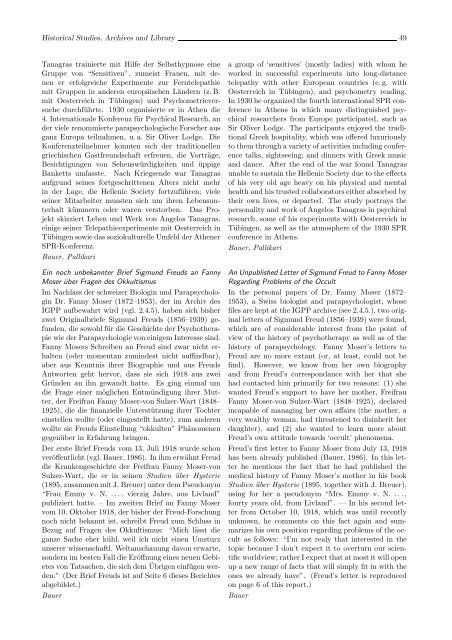
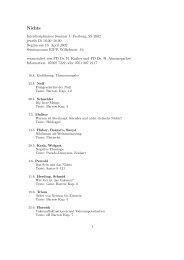
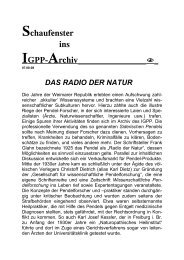
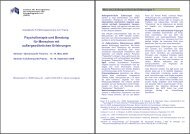
![Findliste Nachträge1 [pdf] - IGPP](https://img.yumpu.com/22552359/1/184x260/findliste-nachtrage1-pdf-igpp.jpg?quality=85)
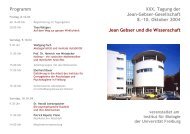
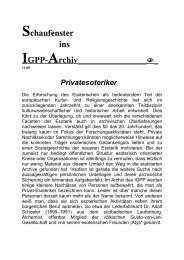
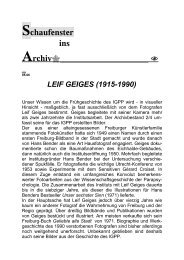
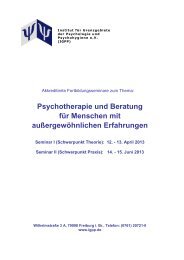
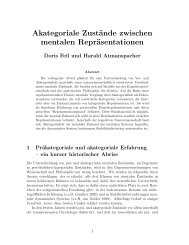
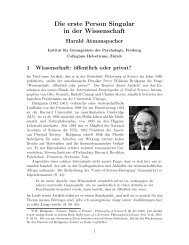
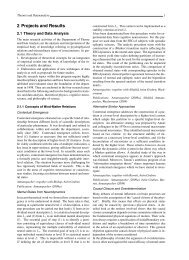
![Findliste [pdf] - IGPP](https://img.yumpu.com/22552265/1/190x245/findliste-pdf-igpp.jpg?quality=85)
